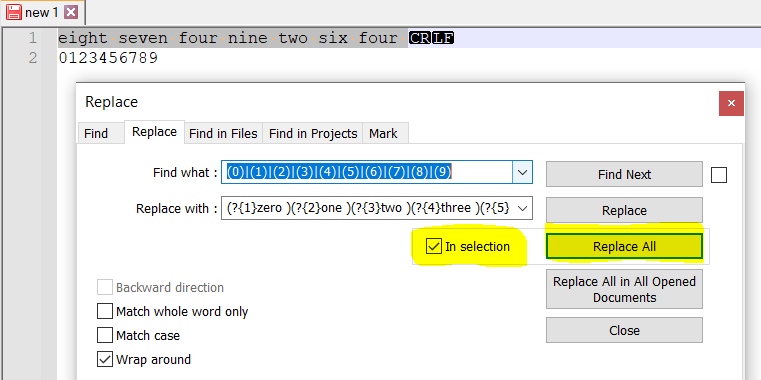Numbers to words converter
-
Hello…Is there a way to convert a number sequence to words (digit-wise) in Notepad++ or any other software? For example…8749264 -> Eight Seven Four Nine Two Six Four? All the numbers to words converters on the internet convert numbers to billions, millions etc. For example…Eight Million, Seven Hundred etc…
-
@alwin-crosse said in Numbers to words converter:
Is there a way to convert a number sequence to words (digit-wise) in Notepad++
Yes, indeed. It uses what is called a regular expression. So using the Replace Function we have:
Find What:(0)|(1)|(2)|(3)|(4)|(5)|(6)|(7)|(8)|(9)
Replace With:(?{1}Zero )(?{2}One )(?{3}Two )(?{4}Three )(?{5}Four )(?{6}Five )(?{7}Six )(?{8}Seven )(?{9}Eight )(?{10}Nine )You need to set the search mode to “regular expression”. You can click on “Replace” or “Replace All” buttons. The first will replace ONLY the next instance, whereas the other button changes all numbers in the tab/file.
Note I have included a space character after each word. That will mean this might end up adding a space before an end of sentence if a number is the last character. As an example
386.becomesThree Eight Six ., note the space between six and the DOT character.Terry
-
@terry-r said in Numbers to words converter:
You can click on “Replace” or “Replace All” buttons. The first will replace ONLY the next instance, whereas the other button changes all numbers in the tab/file.
There’s also a method to just change 1 multi-digit number with a single click. See the image below:

So the Replace function is loaded as per previously. Use the mouse to select the area to convert (it will be highlighted with a background colour). Then in the Replace function click on the “In Selection” button, then click on “Replace All” button. It will change just what is selected.
Terry
-
@terry-r said in Numbers to words converter:
That will mean this might end up adding a space before an end of sentence if a number is the last character. As an example 386. becomes Three Eight Six ., note the space between six and the DOT character.
I had a thought overnight on how my solution might be improved. The issue I referred to was the final space character added where it wasn’t needed for the last digit. In my example I showed a multi-digit number immediately before a punctuation mark. In my example it was a DOT, although could easily be a comma, semi-comma or even inside of parentheses, any non-digit in fact.
So I made an improvement, here it is:
Find What:(?:(0)|(1)|(2)|(3)|(4)|(5)|(6)|(7)|(8)|(9))((?=\d))?
Replace With:(?{1}Zero)(?{2}One)(?{3}Two)(?{4}Three)(?{5}Four)(?{6}Five)(?{7}Six)(?{8}Seven)(?{9}Eight)(?{10}Nine)(?{11} )So for anyone wanting a description, here it is:
The first set of parentheses is a non-capture one(?:…), this avoids the need to change all numbering in the replacement field. Here we look for any of the numbers 0 to 9. Each number is also in it’s own capture group and in the replacement field that numbered capture group is used to replace the number with its associated word.The
((?=\d))?is another capture group surrounding a positive lookahead, this capture group includes the final?, this means the capture group does not need to actually capture if there is no number ahead. This is the 11th capture group and in the replacement there is a test for this 11th capture. If that test (a number ahead) was true it then adds a space after the word.Terry
-
Hello, @alwin-crosse, @terry-r and All,
Regarding this topic, here is two variations which may interest some people :
- Changing numbers, between
0and999, into letter-numbers :
https://sourceforge.net/p/notepad-plus/discussion/331753/thread/171471a4/#59f6
and the regex explanations, in the last post :
https://sourceforge.net/p/notepad-plus/discussion/331753/thread/171471a4/#cacb
- Changing letter-numbers, between
0and999, into numbers :
https://sourceforge.net/p/notepad-plus/discussion/331753/thread/52cf361c/#8edf
In order to verify that every number is correctly translated :
-
Open an empty tab
-
Hit
10times on theEnterkey -
Open the Replace dialog (
Ctrl + H)-
SEARCH
(?-s)^\R -
REPLACE
$0$0$0$0$0$0$0$0$0$0 -
Tick the
Wrap aroundoption -
Select the
Regular expressionsearch mode -
Click twice on the
Replace Allbutton
-
=> You’ll get a list of
1000empty lines-
Open the column editor option (
Alt + C)-
Choose the radio button
Number to Insert -
Initial number
0 -
Increase by :
1 -
Repeat
1 -
Untick the
Leading zerosoption -
Click on the
OKbutton
-
-
Delete the last number
1000 -
Run the
Edit > Blank Operations > Trim Trailing Spaceoption
Now, use, for instance, this regex S/R :
SEARCH
(((1)|(2)|(3)|(4)|(5)|(6)|(7)|(8)|(9))?((0)|(1)|(2)|(3)|(4)|(5)|(6)|(7)|(8)|(9)))?((0)|(1)|(2)|(3)|(4)|(5)|(6)|(7)|(8)|(9))REPLACE
$0\t\t=>\t(?3one)(?4two)(?5three)(?6four)(?7five)(?8six)(?9seven)(?10eight)(?11nine)(?2 hundred(?13(?24: and ): and ))(?15twenty)(?16thirty)(?17forty)(?18fifty)(?19sixty)(?20seventy)(?21eighty)(?22ninety)(?12(?14:(?13:(?24:-))))(?14(?24ten)(?25eleven)(?26twelve)(?27thirteen)(?28fourteen)(?29fifteen)(?30sixteen)(?31seventeen)(?32eighteen)(?33nineteen):(?25one)(?26two)(?27three)(?28four)(?29five)(?30six)(?31seven)(?32eight)(?33nine))(?1:(?24zero))You should get :
0 => zero 1 => one 2 => two 3 => three 4 => four 5 => five ... ... 995 => nine hundred and ninety-five 996 => nine hundred and ninety-six 997 => nine hundred and ninety-seven 998 => nine hundred and ninety-eight 999 => nine hundred and ninety-nine
Finally :
-
Move to the very beginning of the new tab
-
Do a
1000×8rectangular selection and hit theDeletekey -
Move again at the very beginning
And, for instance, use the reverse regex S/R :
SEARCH
(((one)|(two)|(three)|(four)|(five)|(six)|(seven)|(eight)|(nine)) hundred and )?((((twenty)|(thirty)|(forty)|(fifty)|(sixty)|(seventy)|(eighty)|(ninety))(-((one)|(two)|(three)|(four)|(five)|(six)|(seven)|(eight)|(nine)))?)|(ten)|(eleven)|(twelve)|(thirteen)|(fourteen)|(fifteen)|(sixteen)|(seventeen)|(eighteen)|(nineteen)|((one)|(two)|(three)|(four)|(five)|(six)|(seven)|(eight)|(nine))( hundred)?)|(zero)REPLACE
(?{3}1)(?{4}2)(?{5}3)(?{6}4)(?{7}5)(?{8}6)(?{9}7)(?{10}8)(?{11}9)(?{15}2)(?{16}3)(?{17}4)(?{18}5)(?{19}6)(?{20}7)(?{21}8)(?{22}9)(?{23}(?{25}1)(?{26}2)(?{27}3)(?{28}4)(?{29}5)(?{30}6)(?{31}7)(?{32}8)(?{33}9):(?{14}0))(?{34}10)(?{35}11)(?{36}12)(?{37}13)(?{38}14)(?{39}15)(?{40}16)(?{41}17)(?{42}18)(?{43}19)(?{1}(?{44}0))(?{45}1)(?{46}2)(?{47}3)(?{48}4)(?{49}5)(?{50}6)(?{51}7)(?{52}8)(?{53}9)(?{54}00)(?{55}0)\t\t=\t\($0\)You’ll obtain :
0 = (zero) 1 = (one) 2 = (two) 3 = (three) 4 = (four) 5 = (five) ... ... 995 = (nine hundred and ninety-five) 996 = (nine hundred and ninety-six) 997 = (nine hundred and ninety-seven) 998 = (nine hundred and ninety-eight) 999 = (nine hundred and ninety-nine)Best Regards,
guy038
- Changing numbers, between
-
This post is deleted! -
@terry-r Oh my God Terry and guy038…That was an absolutely awesome explanation. Thank you so very much for taking the time to answer my question in such a clear and indepth way. I am very thankful and grateful to youll for all the help.